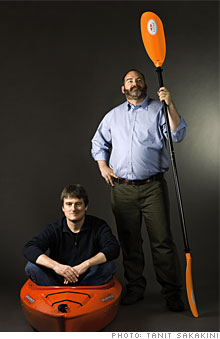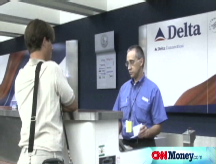Happy customers - and no service staff
Travel website Kayak.com uses a do-it-yourself online database to help keep millions of users happy, without employing a single customer-service representative.

 |
| English (left) and Giza run a tight ship. Every employee at Kayak.com answers customer service queries - and the results are tracked for all to see. |
(FORTUNE Small Business) -- When Paul English co-founded his latest company, Kayak.com, he made an unusual rule: No dedicated customer-service staff would be hired. Every employee, including himself, would spend about 20 minutes of each workday responding to online queries and complaints.
If that sounds strange, consider Kayak's unusual business model. The five-year-old travel website competes with Expedia (EXPE), Orbitz (OWW), and Travelocity. But unlike those services, Kayak doesn't make bookings. Customers use Kayak.com to efficiently search for airline and hotel deals all over the Web. Travel providers pay Kayak a commission for most customers who click through.
English, 44, wanted his users to have as short and sweet an experience on Kayak as possible. Time is of the essence in responding to any question they might have. So even as he enlisted his entire staff, English needed a system that would quickly route feedback to employees - and encourage them to reply as quickly as possible.
When it comes to managing customer service, owners such as English have no shortage of high-tech options. Worldwide, companies spend more than $6 billion a year on customer software suites from giants such as Oracle (ORCL, Fortune 500) and Siebel. But those products tend to be expensive and cumbersome. Ever since Kayak's launch in 2004, English has used a relatively cheap and simple online tool called QuickBase - and says it saves him about $300,000 a year.
QuickBase, hosted by Intuit (INTU), is a database that automatically gathers many kinds of information - in Kayak's case, the more than 200 feedback forms that customers fill out each day.
QuickBase is hardly the simplest online database on the market. Its clunky interface can be difficult for new users, including some Kayak employees, to navigate. Similar applications, such as LongJump, Coghead, and Rollbase, all of which English considered, are aimed at less tech-savvy users.
But English and his CTO, Jim Giza, decided that QuickBase was the most "durable and adaptable" option. They could customize it quickly and easily, even while it was operating.
Kayak's version of QuickBase divides the feedback evenly among the 58 employees so that everyone is answering about four messages a day. The most common message is a complaint about what Kayak calls "air quality" - when customers click through to an airline's Web site only to find that the ticket has shot up in price. Kayak can only apologize and explain.
"Sorry we gave you false hopes," wrote one employee in response to a woman whose fare had doubled. "Air fares can go up and down dramatically in a very short time."
QuickBase tracks all complaints and responses on a giant screen at Kayak's office in Norwalk, Conn. Slacker employees are marked in red. Airlines with the most air-quality problems appear in a section called Wall of Pain.
"We fix customer problems in real-time," English says. "Paying an engineer to do that for 20 minutes is cheaper than outsourcing the problem."
It doesn't seem to have hurt the business: English claims that Kayak is on track to post $140 million in revenue this year, up from $3 million in 2005.
The company spends a total of $10,000 a year on QuickBase licenses and related hardware. English says he would have to spend $300,000 a year in salaries and benefits for an estimated 12 extra staffers he would need to run traditional customer-service software. He also saves on other software: Kayak uses QuickBase to manage projects, vendors, and some accounts.
"Small businesses would be foolish to not at least test this kind of solution," says Yankee Group analyst Joshua Holbrook. "You're at a competitive disadvantage if you don't." ![]()
Boosting teamwork with wikis
Running an entire business from smartphones
Beat the slump with customer service
-
The Cheesecake Factory created smaller portions to survive the downturn. Play
-
A breeder of award-winning marijuana seeds is following the money and heading to the U.S. More
-
Most small businesses die within five years, but Amish businesses have a survival rate north of 90%. More
-
The 10 most popular franchise brands over the past decade -- and their failure rates. More
-
These firms are the last left in America making iconic products now in their twilight. More









